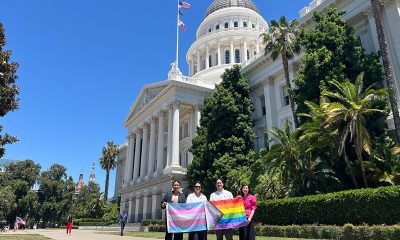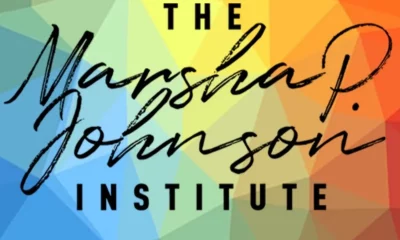Uganda
Uganda Human Rights Commission asks government to decriminalize homosexuality
Anti-Homosexuality Act took effect in 2023

Uganda’s state-funded human rights body has broken its silence on the queer community’s rights by advocating for their protection amid the enacted Anti-Homosexuality Act that is currently under appeal at the Supreme Court.
The Uganda Human Rights Commission on Sept. 26 while defending LGBTQ rights asked President Yoweri Museveni’s government to decriminalize homosexuality and other “victimless crimes.”
“Criminalizing such acts often results in unjust and disproportionate punishment, especially for vulnerable groups in our society,” Mariam Wangadya, who chairs the commission, said.
Wangadya, a lawyer and human rights advocate, spoke for the first time about the commission’s position on queer rights in Uganda since President Yoweri Museveni in May 2023 signed the Anti-Homosexuality Act.
She spoke during the annual stakeholders meeting for ACTV-Uganda, a rights organization that advocates against torture, gender-based violence, and other forms of violence, and has provided care to victims and survivors for 30 years with the commission’s support.
Wangadya acknowledged ACTV-Uganda’s important role in providing the commission with medical reports for torture cases to assist it in determining compensation for survivors of torture to rebuild their lives.
“Of the 939 cases currently pending a hearing before our tribunal, 50 percent of those are allegations of violation of the right to freedom from torture, inhuman and degrading treatment,” she noted.
Her sentiments on the commission’s stand on LGBTQ rights also come barely two weeks after holding talks with two rights groups: The Human Rights Awareness and Promotion Forum (HRAPF) and Support Initiative for People with Congenital Disorders (SIPD), an intersex lobby group, on Sept. 14.
The meeting between the commission, HRAPF, and SIPD, which also documents and publishes reports on queer rights abuses in Uganda, explored human rights violations based on sexual orientation, gender identity and expression, and sex characteristics.
“We must ensure that every person in Uganda enjoys their human rights without discrimination,” Wangadya said.
The commission also noted that engaging the intersex lobby group was vital to address their “often-overlooked issues and rights.”
The Ugandan government has yet to recognize intersex people as a protected minority group, unlike in Kenya. This year’s national Census did not count them.
HRAPF Executive Director Adrian Jjuuko applauded the meeting with Wangadya as a “progressive step” in defending the rights of the queer community and intersex people.
“We commend the commission on creating a space for dialogue on issues of criminalized minorities in Uganda,” Jjuuko said.
Wangadya held the first meeting with Jjuuko on Sept. 9. It focused on HRAPF’s periodical reports on violations against sexual minorities in Uganda.
Wangadya and Jjuuko during the meeting both agreed that all people deserve protection under the law and the commission has to protect everyone, regardless of their sexual orientation and gender identity.
“You need to talk to the Judiciary, the police, and the director of Public Prosecutions. These are our major disturbing areas,” Jjuuko said, accusing the three government agencies of undermining intersex and LGBTQ rights in the country.
Wangadya acknowledged the contribution of the three judicial agencies in protecting and upholding human rights, but noted that there is a need for working with Kenya, South Africa, and other countries to understand how they navigate LGBTQ and intersex legal issues.
“Kenya will be much better for benchmarking considering that in South Africa the constitution provides for that (queer rights.) Benchmarking from a country like Kenya with similar laws may be more helpful,” she said.
The Wangadya also committed to tapping into HRAPF’s human rights strategies and experiences to improve the commission’s mechanisms.
HRAPF promotes respect for the rights of marginalized and minority groups in Uganda through advocacy, offering legal aid, and providing capacity building. Its latest August report on monthly advocacy, violence and other human rights abuses based on sexual orientation or gender identity since the Anti-Homosexuality Act took effect shows anti-LGBTQ violence remains rampant, while evictions and arrests continue to drop.
The report states that a total of 56 human rights violations were recorded in August, versus 72 cases in July.
Of the 56 cases, 20 cases (35.7 percent) were based on sexual orientation or gender identity, versus 34 cases (41.2 percent) in July. The number of also reported victims also dropped from 40 people in July to 24 people in August. The 20 cases targeting LGBTQ people involved violence and threats (10), eviction from housing (nine), and one arrest.
Uganda’s Women Human Rights Defenders Network welcomed the commission’s inaugural meetings with HRAPF and SIPD, and asked the state-funded rights body to continue holding regular dialogues to help “create an enabling environment for SOGIESC (sexual orientation and gender identity and expression.)”
Wangadya’s comments coincided with a protest outside Uganda’s Permanent Mission to the U.N. in New York that a group of activists organized.
The World Bank Group in August 2023 suspended new lending to Uganda in response to the Anti-Homosexuality Act. The activists who organized the protest demanded the World Bank not resume loans to the country.
Uganda
Ugandan advocacy groups step up fight against mpox
More than 500 new cases reported in country over last two weeks

As mpox cases continue to surge in Uganda, LGBTQ+ rights organizations have raised concerns over its “troubling increase” among the queer community and have advised it to be on high alert.
The Uganda Key Populations Consortium, an LGBTQ+ rights organization, working closely with the Health Ministry and Kampala Capital City Authority and other government bodies to stem the spread of mpox, has warned that queer people in semi-urban areas are the most affected.
“These communities have expressed valid concerns regarding stigma and discrimination which may deter individuals from seeking necessary medical attention,” UKPC Director General Richard Lusimbo said.
Uganda has recorded 512 new mpox cases in the last two weeks, bringing the total number of cases to 2,127 and 12 deaths, as the Health Ministry confirmed on Tuesday. The World Health Organization’s latest multi-country report on the mpox outbreak, released on Jan. 11, indicates that Uganda has recorded 1,552 cases and 12 deaths since the disease was first reported last July..
The WHO report places the capital Kampala with the highest number of mpox diseases spread through community transmission with an infection incidence of 45 cases per 100,000 people, followed by the Wakiso and Nakasongola districts.
“Cases have been reported in at least 49 percent (71 out of 146) of districts in the country, but the epidemic remains largely concentrated in and around Kampala,” the WHO report reads. “So far, only clade Ib MPXV, linked to the outbreak in the eastern Democratic Republic of the Congo, has been detected in the country, and current evidence indicates that transmission of the virus is occurring exclusively through close, physical human-to-human contact.”
People between 20-29 are the most affected group, with sexual contact as a major mode of transmission among sex workers and men who have sex with men.
The UKPC has issued an urgent health advisory to the queer community as it collaborates with the Health Ministry and KCCA in responding to the mpox transmission through immediate and long-term actions, including integrating its response with ongoing HIV prevention and care strategies.
Lusimbo, whose organization has also partnered with WHO and the Most At Risk Populations Initiative, a local health NGO, to stem the spread of mpox stated a unified preventive approach that is inclusive and effective is vital for the health and safety of all Ugandans.
“The fear of stigma and discrimination can exacerbate the situation by hindering effective response and treatment efforts,” Lusimbo said.
He noted that the fight against mpox in Uganda is not just limited to managing a health crisis. It also offers the queer community an opportunity to advocate for the rights and dignity of the marginalized groups.
The UKPC last week unveiled an online survey on the mpox epidemic targeting queer people in Uganda to reliably understand its impact on them and their knowledge about the disease.
“Mpox continues to disproportionately affect mostly our community, especially female sex workers and their clients, and men who have sex with men,” the survey reads. “As the national secretariat and coordinating body for key populations, UKPC, in partnership with KCCA, has been leading important discussions on the disease’s public health implications in areas where the impact is most notable.”
The report states the survey data will help develop tailored, inclusive, and equitable interventions for the LGBTQ+ community. The survey also seeks to provide specific numbers of queer people who have contracted mpox and those who have died from the disease.
Uganda Minority Shelters Consortium Coordinator John Grace attributed the lack of data about queer people affected by mpox to privacy concerns, stigma, and discrimination against the community by the homophobic public and state authorities tasked with enforcing anti-homosexuality laws. He said the Anti-Homosexuality Law has created a significant barrier for queer people to report such abuses.
“This makes it difficult to ascertain the true extent of stigma and discrimination or the impact of misinformation about transmission methods,” Grace said.
Grace also noted the collaboration between LGBTQ+ organizations and healthcare providers in tackling mpox has been “inconsistent.”
“While some providers have been welcoming and supportive, others demonstrate a lack of awareness or sensitivity regarding the specific needs of the LGBTQ+ community,” he said.
Despite the homophobic climate in Uganda amid the fight against mpox, Grace noted many LGBTQ+ organizations have proactively disseminated accurate information to educate queer people about the disease’s prevention within their communities through educational campaigns and safer sex practices.
Uganda
Ugandan minister: Western human rights sanctions forced country to join BRICS
President Yoweri Museveni signed Anti-Homosexuality Act in 2023

Ugandan Foreign Affairs Minister Henry Oryem has revealed U.S. and EU sanctions over the country’s Anti-Homosexuality Act and other human rights violations have pushed Kampala to join the BRICS bloc.
Oryem noted Western powers’ decision to sanction other countries without U.N. input is against international norms, and Uganda needed to shield itself from such actions by aligning with the bloc that includes China, Russia, India, South Africa, Brazil, Egypt, the United Arab Emirates, Ethiopia, Iran, and Indonesia. (Consensual same-sex sexual relations remain criminalized in the United Arab Emirates, Egypt, and Ethiopia. Iran is among the countries in which consensual same-sex sexual relations remain punishable by death.)
Kampala officially became a BRICS member on Jan. 1, joining eight other countries whose applications for admission were approved last October during the bloc’s 16th annual summit in Kazan, Russia.
“The United States and European Union, whenever they impose sanctions, expect all those other countries to make sure they abide by those sanctions and if you don’t, you face penalties or even they sanction you,” Oryem said.
Oryem spoke before parliament’s Foreign Affairs Committee on Tuesday.
MPs asked him to explain the circumstances that led Uganda to join BRICS and the country’s financial obligation from the membership.
“Now because of that and the recent events, you have realized that the United States and European Union have started freezing assets of countries in their nations without UN resolutions which is a breach of international world order,” Oryem said. “Uganda can’t just standby and look at these changes and not be part of these changes. It will not be right.”
Oryem also said President Yoweri Museveni’s Cabinet discussed and approved the matter before he directed the Foreign Affairs Ministry to write to the BRICS Secretariat about admitting Uganda into the bloc.
The U.S. and other Western governments condemned Museveni’s decision to sign the Anti-Homosexuality Act, and announced a series of sanctions against Kampala.
Washington, for example, imposed visa restrictions on government officials who championed the Anti-Homosexuality Act, re-evaluated its foreign aid and investment engagement with Uganda, including the President’s Emergency Plan for AIDS Relief (PEPFAR), and reviewed Kampala’s duty-free trade with the U.S. under the African Growth and Opportunity Act for sub-Saharan African countries.
The U.S. in May 2024 imposed sanctions on House Speaker Anita Among and four other senior Ugandan government officials accused of corruption and significant human rights violations.
Although the EU criticized the enactment of the Anti-Homosexuality Act, the 27-member bloc did not sanction Kampala, despite pressure from queer rights activists. The state-funded Uganda Human Rights Commission and several other human rights groups and queer activists, meanwhile, continue to pressure the government to withdraw implementation of the law.
UHRC Chair Mariam Wangadya, who called on the government to decriminalize homosexuality last month, has said her commission has received reports that indicate security officers who enforce the Anti-Homosexuality Act have subjected marginalized communities to discrimination and inhuman and degrading treatment
“As a signatory to several international and regional human rights conventions, Uganda is committed to ensuring non-discrimination and equality before the law,” Wangadya said. “At the domestic level, Uganda’s constitution, under Article 21, prohibits discrimination based on gender, ensuring equality before the law, regardless of sex, race, ethnicity, or social status.”
Museveni’s son comes out against Anti-Homosexuality Act
Museveni’s son, Army Chief General Muhoozi Kainerugaba, has also emerged as a critic of the Anti-Homosexuality Act.
“I was totally shocked and very hurt. Japanese are warriors like us. I respect them very much. I asked them how we were oppressing them. Then they told me about the AHA,” he said on X on Jan. 3 while talking about how the Japanese questioned him over Uganda’s persecution of queer people during his recent visit to Tokyo. “Compatriots, let’s get rid of that small law. Our friends around the world are misunderstanding us.”
Kainerugaba, who is positioning himself as Museveni’s successor, had already declared an interest in running for president in 2026 before he withdrew last September in favor of his 80-year-old father who has been in power for more than three decades.
In his X post, Kainerugaba also indicated that “we shall remove this Anti-Homosexuality Act in 2026.” He left the platform six days later after his posts threatened Uganda’s diplomatic relations.
“They (gays) are sick people, but since the Creator made them … what do we do? Even ‘kiboko’ (whips) might not work. We shall pray for them,” Kainerugaba said.
The Supreme Court is currently considering a case that challenges the Anti-Homosexuality Act. The Constitutional Court last April upheld the law.
Uganda
Ugandan court awards $40K to men tortured after arrest for alleged homosexuality
Torture took place in 2020 during COVID-19 lockdown

A Ugandan court on Nov. 22 awarded more than $40,000 (Shs 150 million) to 20 men who police tortured after their 2020 arrest for alleged homosexuality.
The High Court of Uganda’s Civil Division ruling notes “police and other state authorities” arrested the men in Nkokonjeru, a town in central Uganda, on March 29, 2020, and “allegedly tortured.”
“They assert that on the morning of the said date their residence was invaded by a mob, among which were the respondents, that subjected them to all manner of torture because they were practicing homosexuality,” reads the ruling. “The alleged actions of torture include beating, hitting, burning using a hot piece of firewood, undressing, tying, biding, conducting an anal examination, and inflicting other forms of physical, mental, and psychological violence based on the suspicion that they are homosexuals, an allegation they deny.”
The arrests took place shortly after the Ugandan government imposed a lockdown in response to the COVID-19 pandemic.
“Based on the same suspicion (of homosexuality), the applicants were then arrested, taken to Nkokonjeru B police station, and charged with doing a negligent act likely to spread infection by disease,” reads the ruling.
The ruling notes the men “were charged” on March 31, 2020, and sent to prison, “where they were again allegedly beaten, examined, harassed, and subjected to discrimination.”
Consensual same-sex sexual relations remain criminalized in Uganda.
President Yoweri Museveni in 2023 signed the Anti-Homosexuality Act, which contains a death penalty provision for “aggravated homosexuality.” LGBTQ+ activists continue to challenge the law.
Sexual Minorities Uganda Executive Director Frank Mugisha on X described the Nov. 22 ruling as a “significant victory for the LGBTQ+ community.”
Uganda
Report: Uganda’s Anti-Homosexuality Act has cost country $1.6 billion
Open for Business released findings on Oct. 10

Some Ugandan queer rights organizations have asked the government to repeal the country’s Anti-Homosexuality Act that is currently under appeal at the Supreme Court to save the country from huge economic losses.
The organizations, while reacting to a new report that reveals the Anti-Homosexuality Act has cost Uganda up to $1.6 billion since President Yoweri Museveni signed it in May 2023, note the draconian law is not just “regressive” to LGBTQ rights, but also the economy.
The report that Open for Business, a coalition of leading global organizations that champion LGBTQ inclusion, released on Oct. 10 identifies foreign direct investment, donor aid, trade and tourism, and public health and productivity as major areas that economic losses have impacted.
“Combined losses over five years are projected between $2.3 billion and $8.3 billion,” the report states.
The estimated annual loss breakdown to Uganda’s economy includes $75 million in foreign direct investment, more than $1 billion in donor funding, $312 million in the fight against HIV/AIDS and other public health efforts, $99 million in tourism and $500,000 in trade for tariff payments after the Biden-Harris administration suspended Kampala from the preferential Africa Growth and Opportunity Act.
Other projected annual losses over the next five years because of the Anti-Homosexuality Act are $24 million in labor production because at least 15,000 queer people have fled Uganda, $58 million in national productivity from homophobic stigma and legal repercussions for LGBTQ people, and $500,000 from over-policing and legal costs associated with the law’s enforcement.
The recorded and projected Uganda’s economic losses are attributed to its strained relations with international partners, such as Western countries that imposed sanctions on Kampala over the Anti-Homosexuality Act, and global financiers, such as the World Bank Group that suspended funding.
The Open for Business report notes Kampala’s damaged global relations and funding suspension has impacted Ugandans’ access to antiretroviral therapy because of shortages and medical workers who refuse to treat queer patients because they fear that authorities will punish them.
It also indicates the impact on Uganda’s tourism sector because of the Anti-Homosexuality Act’s negative global perceptions has indirectly affected the hospitality, transport, and retail industries.
“As the global economy becomes more interconnected and competitive, countries that fail to embrace diversity, and inclusivity are likely to fall behind,” the report states.
The report points out that nearly half of the 49 percent of Ugandans who sought asylum in the UK last year said homophobia prompted them to flee the country. It warns this exodus diminishes Kampala’s growth potential and urges Museveni’s administration to amend or repeal the Anti-Homosexuality Act to restore international confidence in economic support and investment.
“Uganda continues to enforce the AHA (Anti-Homosexuality Act) without addressing international concerns, leading to severe economic isolation,” the report states.”In this scenario, FDI (foreign direct investment) and donor aid could decline sharply, tourism might collapse, and key partners could impose more trade sanctions.”
Uganda Minority Shelters Consortium, a local NGO that supports and advocates for the rights of LGBTQ people who are homeless and/or victims of violence, described the report’s findings as “alarming,” and added it shows how the Anti-Homosexuality Act and other anti-LGBTQ policies affect the economy.
UMSC Coordinator John Grace told the Washington Blade that the Ugandan government should heed the report’s warnings and “take immediate action to repeal the AHA in its entirety” and not to hurt the country’s economic development.
“The economic cost of this discriminatory law is too high and the human rights violations it perpetuates are unacceptable,” Grace said.
Grace also noted the projected exodus of 15,000 LGBTQ people from Uganda because of the Anti-Homosexuality Act would be a “tragic loss” for the country in terms of skilled manpower.
Let’s Walk Uganda, a local lobby group that openly LGBTQ people lead, also responded to the report, noting its findings add more economic pain to the “ravages of the COVID-19 pandemic.”
“The anxiety within the investment and general business community as a result of the AHA cannot be underestimated,” Let’s Walk Uganda Legal Manager Alex Musiime said. “The ridiculous law should be dropped. The court (Supreme Court) ought to do the right thing and annul this apartheid law.”
Musiime said the World Bank and Uganda’s other international partners and financiers should “intensify dialogue” with Museveni’s government to repeal the Anti-Homosexuality Act to save the vulnerable population from the suffering that the freezing of crucial aid to them has caused.
“The Ugandan government should be moved to commit to respecting the rights of LGBTQ+ persons in the implementation of World Bank projects. It should treat this piece of hate in the AHA as no law at all,” he said.
Both Musiime and Grace applauded the Uganda’s Human Rights Commission’s recent plea for the government to decriminalize consensual same-sex sexual relations. They consider it a “positive step” that should be “followed by concrete actions” to end homophobic discrimination, violence, and harassment.
Uganda
Activists urge the World Bank not to resume lending to Uganda
Country’s Anti-Homosexuality Act signed in 2023

A group of activists who organized a protest outside Uganda’s Permanent Mission to the U.N. in New York on Thursday demanded the World Bank Group not resume loans to the country.
The World Bank in August 2023 suspended new lending to Uganda in response to the country’s Anti-Homosexuality Act that President Yoweri Museveni signed.
“The law needs to be struck down and repealed. Hard stop,” acting U.S. World Bank Executive Director L. Felice Gorordo told the Washington Blade during a March 27, 2024, interview at his office in Washington. “We continue to advocate for that.”
Thursday’s protest coincided with the U.N. General Assembly that began earlier in the week in New York.
A press release the activists issued before the protest notes the World Bank “recently started testing a package of ‘mitigation measures’ to determine if discrimination is taking place.” The Council for Global Equality, the Human Rights Campaign, Immigration Equality, Outright International, Sexual Minorities Uganda, and Health GAP are among the more than 100 LGBTQ rights organizations from around the world that urged World Bank President Ajay Banga in a Sept. 16 letter not to restart lending to Uganda.
“We are writing to you from Uganda and around the world now because we are alarmed by the World Bank’s plan for mitigation measures in Uganda,” reads the letter. “The World Bank has announced that it will be testing the effectiveness of ‘mitigation measures’ from July-September 2024 and that the World Bank will restart lending if they decide the measures are effective in protecting LGBTQ+ people from discrimination.”
Richard Lusimbo, director general of the Uganda Key Population Consortium, in the press release said the World Bank’s “so-called ‘mitigation measures’ are a façade, designed to provide the illusion of protection.”
“They rely on perpetrators of discrimination — the government of Uganda — to implement the measures fairly,” he said. “How can they be taken seriously?”

A World Bank spokesperson on Friday responded to the Washington Blade’s request for comment about the protest.
“The World Bank cannot deliver on its mission to end poverty and boost shared prosperity on a livable planet unless all people can participate in, and benefit from, the projects we finance,” said the spokesperson.
The spokesperson referred the Blade to an Aug. 8, 2023, statement that announced the suspension of new loans to Uganda.
“Immediately after the law was enacted, the World Bank deployed a team to Uganda to review our portfolio in the context of the new legislation,” reads the statement. “That review determined additional measures are necessary to ensure projects are implemented in alignment with our environmental and social standards. Our goal is to protect sexual and gender minorities from discrimination and exclusion in the projects we finance. These measures are currently under discussion with the authorities.”
“We will not propose any new public financing for Uganda to our board until we are satisfied that additional mitigation measures are in place,” the spokesperson told the Blade on Friday. “These mitigation measures have been designed to ensure beneficiaries of bank-financed projects are not discriminated against and receive equal access to services.”
One such mitigation measure is “stakeholder engagement” that, among other things, seeks to strengthen “consultations to detect instances of exclusion or discrimination (do-no harm safety.)” Another specifically highlights “labor and working conditions” and focuses on the need for “training on inclusion and non-discrimination for borrowers (e.g., contractors and sub-contractors) and mobilization of communities” and including “provisions of non-discrimination in contracts.”
The World Bank has said the Ugandan government has agreed to the mitigation measures.
Clare Byarugaba of Chapter 4 Uganda said there “can be no business as usual between the World Bank and the government of Uganda while this law remains in force.”
“We are gravely concerned that President Banga is turning his back on us, and breaking his commitments to ensuring non-discrimination,” she said.
-

 Television4 days ago
Television4 days agoThe ‘Stranger Things’ coming out scene: The reaction and the relevance
-

 a&e features3 days ago
a&e features3 days agoQueer highlights of the 2026 Critics Choice Awards: Aunt Gladys, that ‘Heated Rivalry’ shoutout and more
-

 Features12 hours ago
Features12 hours ago“We deserve to have a future here”: How we can support queer AAPI communities in 2026
-

 National3 days ago
National3 days agoTop 10 LGBTQ national news stories of 2025
-

 Events1 day ago
Events1 day agoGlowing tigers and butterflies will light up LA Pride’s first event this year at L.A. Zoo
-

 LGBTQ Non-Profit Organizations11 hours ago
LGBTQ Non-Profit Organizations11 hours agoPassing the brick: How MPJI is centering Black and Brown trans voices
-

 Viewpoint1 day ago
Viewpoint1 day agoFrom closeted kid to LGBTQ+ journalist: queer community is my guiding light
-

 a&e features1 day ago
a&e features1 day agoLooking back at the 10 biggest A&E stories of 2025
-

 Colombia11 hours ago
Colombia11 hours agoGay Venezuelan man who fled to Colombia uncertain about homeland’s future
-

 Movies11 hours ago
Movies11 hours agoTig Notaro & Zack Snyder’s hot lesbian action film







